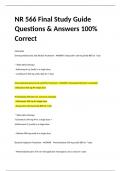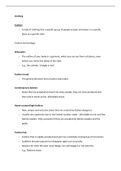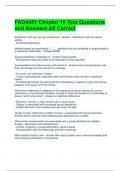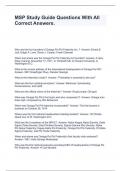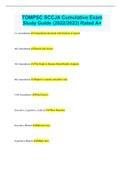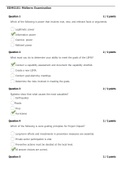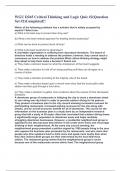ENGR 201 ELECTRICAL STUDY GUIDE EXAM Concordia University
1. GENERAL
$ Primary electrical power is provided by two engine driven generators which supply three-phase, 115 volt 400
cycle alternating current.
$ B737 Classics : Each generator supplies its own bus in normal operation and can also supply
essential loads of the opposite side bus system when one generator is inoperative.
$ B737-NG : Each generator supplies its own bus in normal operation and can also supply essential loads and
non-essential loads of the opposite side bus system when one generator is inoperative.
$ Step down transformers provide low voltage AC power for lighting, instruments and other circuits that use
alternating current at a lower voltage.
$ Transformer rectifier (TR) units supply DC power and a battery provides backup for the AC and DC standby
system.
$ B737 Classics : The APU operates a generator identical to the engine generators and can supply both
engine generator busses on ground or either system in flight.
$ B737 NG : The APU operates a generator identical to the engine generators and can supply both transfer
busses both on ground and in flight.
$ There are two basic principles of operation for the 737 electrical system :
1. There is no paralleling of the AC sources of power.
2. All generator bus sources must be manually connected through the movement of a switch. The source of
power being switched onto a bus will automatically disconnect an existing source.
$ The electrical power system may be categorized into 3 main divisions :
- AC Power System,
- DC Power System,
- Standby Power System.
2. MAIN COMPONENTS AND SUBSYSTEMS B737 CLASSICS vs B737 NG
ELECTRICAL POWER GENERATION
B737 Classics - Engine Generators
$ Primary power is obtained from two generators, one mounted on each engine. Each generator is part of a
generator drive unit which maintains a constant frequency throughout the normal operating range of the
engine. The generator is coupled directly to the engine and operates whenever the engine is running.
B737 NG - Integrated Drive Generators
$ Primary power is obtained from two engine Integrated Drive Generators (IDGs), one mounted on each engine.
The IDG is a common housing containing a generator and drive which allows the generator to maintain a
constant generator speed and thus a constant frequency throughout the normal operating range of the
engine. The IDG is coupled directly to the engine and operates whenever the engine is running.
,APU Generator
$ The APU generator may be used to supply primary power on ground and will serve as backup for either engine
generator in flight. The APU generator is identical to the engine generators but has no generator drive unit
since the APU itself is governed and will maintain a constant generator speed.
External Ground Power
$ An external AC power receptacle located near the nose gear wheel well, on the lower right side of the
fuselage, allows the use of an external power source. Status lights on a panel adjacent to the receptacle
permits the ground crew to determine if the external power is being used.
$ A GRD POWER AVAILABLE Light provides cockpit indication that ground power is plugged in.
$ A GRD PWR Switch allows connection of external power to both generator busses. The Battery Switch must be
ON for the GRD PWR Switch to be operable. Positioning the Battery Switch to OFF will automatically
disconnect external power.
B737 Classics - Ground Service
$ For ground servicing a solenoid held Ground Service Switch is on the forward attendant's panel. This
switch provides power from ground power directly to the AC ground service bus for utility outlets, cabin
lighting and the battery charger without powering all electrical busses.
$ The Ground Service Switch is magnetically held in the ON position and trips OFF when the GRD PWR
Switch is positioned to ON.
B737 NG - Ground Service
$ For ground servicing a solenoid held Ground Service P/B is on the forward attendant's panel. This P/B provides
power from ground power directly to the AC ground service busses for utility outlets, cabin lighting and the
battery chargers without powering all electrical busses.
3. AC POWER SYSTEM
$ AC power = 4 sources (2 engines, 1 APU & 1 Ground Power)
$ B737 Classics : Each AC power system consists of a generator bus, a main bus and a transfer bus. Each transfer
bus has an associated transfer relay which automatically selects the opposite generator bus as a power
supply if its normal generator bus fails and the Bus Transfer Switch is in AUTO. The generator busses are
powered by momentarily positioning the associated Generator Switch to ON. This connects the generator to
its associated generator bus.
$ B737 NG : Each AC power system consists of a transfer bus, a main bus, two galley busses and a ground service
bus. Transfer bus 1 also supplies power to the AC standby bus. If the AC source powering either transfer bus
fails or is disconnected, the transfer bus can be powered by any available source through the tie bus with the
Bus Tie Breakers (BTBs).
$ B737 Classics : On ground, and external power connected, momentarily positioning the Ground Power Switch
to ON trips both engine generators and connects external power to both generator busses.
, $ B737 NG : On ground, and both generator control switches OFF, or with both engines shut down, selecting the
GRD PWR switch to ON connects external power via the tie bus to both transfer busses.
$ B737 Classics : When the APU is operating, electrical power output of the APU generator can be connected to
both generator bus No. 1 and generator bus No. 2 through the respective APU Generator Switches.
Whenever ground power is on both generator busses, and APU or engine generator power is applied to one
generator bus, ground power continues to supply power to the remaining generator bus.
$ B737 NG : Selecting either APU GEN switch ON connects APU power via the tie bus to both transfer busses.
Whichever source is selected last powers both busses. The transfer busses can be powered from the engine
generators by momentarily positioning the related generator switch to ON. This connects the generator to the
transfer bus. Whenever external power or APU is powering both transfer busses and engine generator power
is applied to its onside transfer bus, external power or APU continues to supply power to the remaining
transfer bus.
$ B737 Classics : In flight, each engine generator normally powers its own generator bus. If a generator is
inoperative, the APU generator can be used to power one inoperative generator bus. Since the entire
electrical system is powered from the two generator busses, all electrical components can be powered with
any two operating generators.
$ B737 NG : In flight, each engine generator normally powers its own transfer bus. If an engine generator is no
longer supplying power, the BTBs automatically close to allow the other engine generator to supply both
transfer busses through the tie bus and BTBs. The APU can power either or both busses via the tie bus and the
BTBs. The system also incorporates an automatic generator on-line feature in case the aircraft takes off with
the APU powering both transfer busses. In flight, if the APU is either shut down or fails, the engine generators
are automatically connected to their related transfer busses.
B737 Classics - Bus Transfer System
$ The generator busses and main busses supply the heavy and nonessential electrical loads, respectively.
The transfer busses supply the essential loads.
$ If a generator trips inflight due to a fault, the generator bus and main bus will be de-energized, but the
transfer bus will transfer automatically to the operating generator bus.
$ The electrical system monitors itself for correct voltage and frequency, ground faults in the generator, or
excessive current draw from any generator.
NOTE : If generator No.1 trips off the line, the battery charger transfers to Main Bus No.2 for AC power
B737 NG - Bus Tie System
$ Either generator or the APU can supply power to both transfer busses. If the BUS TRANS switch is in the AUTO
position and the source powering the transfer bus is disconnected or fails, the BTBs close and both transfer
busses are powered from the operative power source.
1. GENERAL
$ Primary electrical power is provided by two engine driven generators which supply three-phase, 115 volt 400
cycle alternating current.
$ B737 Classics : Each generator supplies its own bus in normal operation and can also supply
essential loads of the opposite side bus system when one generator is inoperative.
$ B737-NG : Each generator supplies its own bus in normal operation and can also supply essential loads and
non-essential loads of the opposite side bus system when one generator is inoperative.
$ Step down transformers provide low voltage AC power for lighting, instruments and other circuits that use
alternating current at a lower voltage.
$ Transformer rectifier (TR) units supply DC power and a battery provides backup for the AC and DC standby
system.
$ B737 Classics : The APU operates a generator identical to the engine generators and can supply both
engine generator busses on ground or either system in flight.
$ B737 NG : The APU operates a generator identical to the engine generators and can supply both transfer
busses both on ground and in flight.
$ There are two basic principles of operation for the 737 electrical system :
1. There is no paralleling of the AC sources of power.
2. All generator bus sources must be manually connected through the movement of a switch. The source of
power being switched onto a bus will automatically disconnect an existing source.
$ The electrical power system may be categorized into 3 main divisions :
- AC Power System,
- DC Power System,
- Standby Power System.
2. MAIN COMPONENTS AND SUBSYSTEMS B737 CLASSICS vs B737 NG
ELECTRICAL POWER GENERATION
B737 Classics - Engine Generators
$ Primary power is obtained from two generators, one mounted on each engine. Each generator is part of a
generator drive unit which maintains a constant frequency throughout the normal operating range of the
engine. The generator is coupled directly to the engine and operates whenever the engine is running.
B737 NG - Integrated Drive Generators
$ Primary power is obtained from two engine Integrated Drive Generators (IDGs), one mounted on each engine.
The IDG is a common housing containing a generator and drive which allows the generator to maintain a
constant generator speed and thus a constant frequency throughout the normal operating range of the
engine. The IDG is coupled directly to the engine and operates whenever the engine is running.
,APU Generator
$ The APU generator may be used to supply primary power on ground and will serve as backup for either engine
generator in flight. The APU generator is identical to the engine generators but has no generator drive unit
since the APU itself is governed and will maintain a constant generator speed.
External Ground Power
$ An external AC power receptacle located near the nose gear wheel well, on the lower right side of the
fuselage, allows the use of an external power source. Status lights on a panel adjacent to the receptacle
permits the ground crew to determine if the external power is being used.
$ A GRD POWER AVAILABLE Light provides cockpit indication that ground power is plugged in.
$ A GRD PWR Switch allows connection of external power to both generator busses. The Battery Switch must be
ON for the GRD PWR Switch to be operable. Positioning the Battery Switch to OFF will automatically
disconnect external power.
B737 Classics - Ground Service
$ For ground servicing a solenoid held Ground Service Switch is on the forward attendant's panel. This
switch provides power from ground power directly to the AC ground service bus for utility outlets, cabin
lighting and the battery charger without powering all electrical busses.
$ The Ground Service Switch is magnetically held in the ON position and trips OFF when the GRD PWR
Switch is positioned to ON.
B737 NG - Ground Service
$ For ground servicing a solenoid held Ground Service P/B is on the forward attendant's panel. This P/B provides
power from ground power directly to the AC ground service busses for utility outlets, cabin lighting and the
battery chargers without powering all electrical busses.
3. AC POWER SYSTEM
$ AC power = 4 sources (2 engines, 1 APU & 1 Ground Power)
$ B737 Classics : Each AC power system consists of a generator bus, a main bus and a transfer bus. Each transfer
bus has an associated transfer relay which automatically selects the opposite generator bus as a power
supply if its normal generator bus fails and the Bus Transfer Switch is in AUTO. The generator busses are
powered by momentarily positioning the associated Generator Switch to ON. This connects the generator to
its associated generator bus.
$ B737 NG : Each AC power system consists of a transfer bus, a main bus, two galley busses and a ground service
bus. Transfer bus 1 also supplies power to the AC standby bus. If the AC source powering either transfer bus
fails or is disconnected, the transfer bus can be powered by any available source through the tie bus with the
Bus Tie Breakers (BTBs).
$ B737 Classics : On ground, and external power connected, momentarily positioning the Ground Power Switch
to ON trips both engine generators and connects external power to both generator busses.
, $ B737 NG : On ground, and both generator control switches OFF, or with both engines shut down, selecting the
GRD PWR switch to ON connects external power via the tie bus to both transfer busses.
$ B737 Classics : When the APU is operating, electrical power output of the APU generator can be connected to
both generator bus No. 1 and generator bus No. 2 through the respective APU Generator Switches.
Whenever ground power is on both generator busses, and APU or engine generator power is applied to one
generator bus, ground power continues to supply power to the remaining generator bus.
$ B737 NG : Selecting either APU GEN switch ON connects APU power via the tie bus to both transfer busses.
Whichever source is selected last powers both busses. The transfer busses can be powered from the engine
generators by momentarily positioning the related generator switch to ON. This connects the generator to the
transfer bus. Whenever external power or APU is powering both transfer busses and engine generator power
is applied to its onside transfer bus, external power or APU continues to supply power to the remaining
transfer bus.
$ B737 Classics : In flight, each engine generator normally powers its own generator bus. If a generator is
inoperative, the APU generator can be used to power one inoperative generator bus. Since the entire
electrical system is powered from the two generator busses, all electrical components can be powered with
any two operating generators.
$ B737 NG : In flight, each engine generator normally powers its own transfer bus. If an engine generator is no
longer supplying power, the BTBs automatically close to allow the other engine generator to supply both
transfer busses through the tie bus and BTBs. The APU can power either or both busses via the tie bus and the
BTBs. The system also incorporates an automatic generator on-line feature in case the aircraft takes off with
the APU powering both transfer busses. In flight, if the APU is either shut down or fails, the engine generators
are automatically connected to their related transfer busses.
B737 Classics - Bus Transfer System
$ The generator busses and main busses supply the heavy and nonessential electrical loads, respectively.
The transfer busses supply the essential loads.
$ If a generator trips inflight due to a fault, the generator bus and main bus will be de-energized, but the
transfer bus will transfer automatically to the operating generator bus.
$ The electrical system monitors itself for correct voltage and frequency, ground faults in the generator, or
excessive current draw from any generator.
NOTE : If generator No.1 trips off the line, the battery charger transfers to Main Bus No.2 for AC power
B737 NG - Bus Tie System
$ Either generator or the APU can supply power to both transfer busses. If the BUS TRANS switch is in the AUTO
position and the source powering the transfer bus is disconnected or fails, the BTBs close and both transfer
busses are powered from the operative power source.

